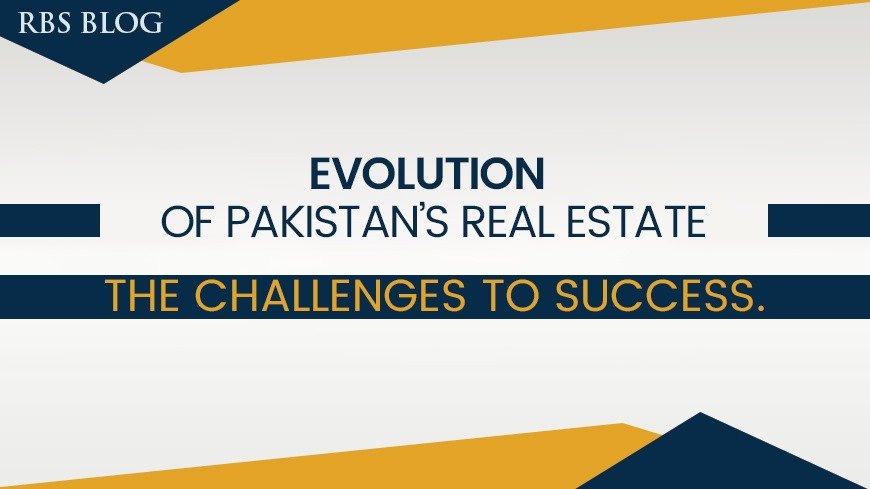- October 18, 2024
- Posted by: Muhammad Afzaal
- Category: Blogs

As a cornerstone of Pakistan’s economy, the real estate sector has grown tremendously over the years. Urban projects like Lahore Smart City and Capital Smart City have transformed the urban landscape in Pakistan Real Estate. However, with the evolution comes challenges, and the industry is pushing all borders to maintain its momentum.
Understanding the struggles, developers have played smartly by adopting problem-solving approaches like presenting flexible payment plans, building smart homes, and switching to sustainable practices. The government is making efforts to increase transparency in the real estate sector. Still, there is plenty of room for improvement. With all the efforts going on, realtors need to understand the market challenges and overcome them promptly to succeed in the long run.
Key Challenges Hindering the Evolution of Pakistan’s Real Estate Sector
1. Regulatory Inconsistencies
The absence of a central real estate regulatory authority in Pakistan makes it easier for investors and developers to navigate the unclear processes. This leads to legal complications, and buyers become uncertain about investing to avoid fraud.
The lack of consistent and uniform regulation in the real estate sector worsens the situation. As the industry is governed by a mix of provincial, federal, and local laws, there is much room for confusion and exploitation for investors.
All these factors together have impacted the real estate sector negatively.
2. Undocumented Transactions & Taxation
The latest tax structure has implemented new capital gains, property transfers, and withholding taxes. Besides creating confusion, the excessive taxes have made people scared of being unable to make ends meet.
Buyers and sellers often keep the transaction undocumented to avoid tax. Understating property’s value and keeping it hidden creates a parallel informal market. Hence, the industry’s transparency is compromised, leading to investor distrust.
3. High Land & Construction Costs
With urbanization, the demand for land in major cities has also increased. Skyrocketed land and construction rates have limited the options for average Pakistanis. Developers find it difficult to reduce construction costs due to expensive raw materials. They are also struggling to complete projects within a given timeline due to supply chain disruption and fluctuating prices of raw materials.
The high cost of bricks, cement, and steel and the shortage of houses in major cities have also increased the challenges of the real estate sector.
4. Economic Fluctuations & Political Instability
Economic fluctuation, political instability, currency devaluation, and inconsistent economic strategies are worsening the challenges to the real estate sector. Together, these factors are causing inflation, affecting financing options, increasing construction costs, and reducing the overall demand for property.
Economic hardships slow down the real estate market. The uncertainty creates distrust among potential overseas investors and local investors alike. As a result, commercial and residential projects face unnecessary delays and reduced investment.
Also Read: Become property savvy – 5 key elements to look out for
5. Limited Financing Access
Obtaining bank loans is a very hectic and patient testing procedure in Pakistan. The high interest rates, limited access to mortgage financing, and stringent lending criteria prevent people from considering it an option. Developers also have to struggle to get loans for large-scale projects, which limits their ability to undertake developments and scale operations.
Here are some of the implementations that Pakistan’s real estate sector needs to cope with the challenges and succeed in the long run;
- Implement unified real estate regulations across the provinces to reduce fraud and ambiguity.
- Digitalize the land registration system to reduce land disputes and ensure transparency.
- Strengthen Real Estate Regulatory Authority (RERA) to promote accountability.
- The government should introduce easy financing options for developers who want to initiate projects with flexible payment options. The capital issued to the developers should be monitored to ensure it is used only in the development process.
- There should be a regulatory system for brokers to prevent unfair practices and corruption.
- The government is already taking the initiative to digitalize land registration, but more efforts are needed to make it conform to international standards.
- Reforms should be made in the land acquisition system. Moreover, the ownership needs to be codified.
Pakistani investors deserve all the protection they need, like any other investor in the market. Implementing these reforms will bring drastic changes in the Pakistan’s real estate market, benefitting investors, buyers, and developers alike. Building a strong legal foundation is necessary, and everything else will fall into place.
